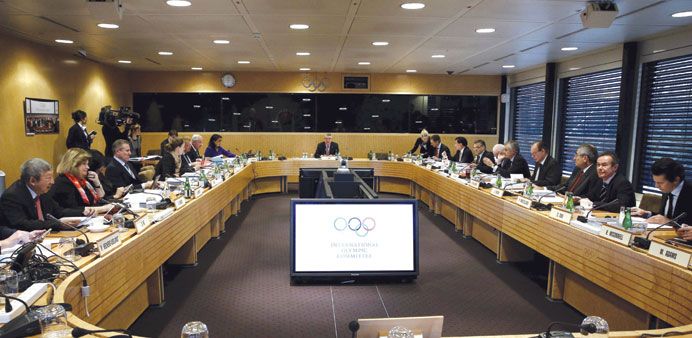International Olympic Committee chief Thomas Bach (centre) addresses participants at the start of the Executive Board meeting at the IOC headquarters in Lausanne yesterday. (Reuters)
Reuters/Lausanne (Switzerland)
The global corruption and doping scandals engulfing sports this year are an opportunity for organisations to undergo change and earn back lost credibility, the president of the International Olympic Committee said yesterday.
On the first anniversary of the IOC’s Agenda 2020 reforms aimed at making the Games a more attractive and transparent prospect, Thomas Bach said transparency was necessary for all sports organisations as was the need for stronger national government involvement in catching and punishing doping cheats.
Bach’s comments in an Op-ed published yesterday comes days after Hamburg’s 2024 Olympic bid spectacularly failed in a city referendum, marking the latest withdrawal of a Games candidate.
Four of the six bidders pulled out of the bidding for the 2022 winter Games, a further two were rejected at national referendums, and so far two—Hamburg and Boston—have pulled out of campaigning for the 2024 summer Olympics in a blow to the IOC and its prime product.
Bach has blamed the doping scandals involving Russian athletes, corruption allegations within the world athletics federation (IAAF) as well as world soccer’s governing body FIFA and a scandal related to the 2006 soccer World Cup in Germany as some of the major reasons for Hamburg citizens rejecting the bid.
“Yes, these times are difficult for sport. But yes, it is also an opportunity to renew the trust in this power of sport to change the world for the better,” Bach said.
“Protecting clean athletes goes hand in hand with ensuring that the environment in which athletes operate is safe from corrupting influences,” added Bach, adding the IOC had already made changes in auditing and financial reporting, term limits for IOC members and introducing ethics officers.
FIFA is struggling with the biggest crisis of its history with dozens of senior members, including vice presidents, arrested in relation to allegations of racketeering, corruption and money laundering.
Germany’s 2006 World Cup scandal has already claimed the job of German FA President and FIFA Executive Committee member Wolfgang Niersbach, under investigation for tax evasion, who resigned last month.
While the scandals are not directly linked to the Olympics, some of them may affect them, as medals may need to be withdrawn and reallocated and athletes disqualified at the end of the doping investigations.
Russia was suspended by the IAAF last month after a report by a Word Anti-Doping Agency special commission exposed widespread state-sponsored doping.
A second part of the report, to be published early next year, is expected to be even more revealing according to the head of the commission.
“Zero tolerance means all nations and all sports have to be compliant with WADA’s rules. On this front, sport requires the support of governments,” Bach said.
“Governments need to make sure that their national anti-authorities are WADA-compliant.
“Governments also have to ensure dealers, corrupt doctors and coaches are punished with the full extent of the law.”
“We must do everything we can to protect those millions of clean athletes around the world,” added Bach, who won a team fencing gold medal at the 1976 Games in Montreal for Germany.
“For their sake and for the credibility of sports competition, they have to be protected from doping and corrupting influences.
“We also have to protect the credibility of sports competition from match-fixing and manipulation. The IOC has created a specific 20-million US dollar fund for the protection of clean athletes.
The statement from Bach, issued ahead of an IOC executive committee meeting due to discuss the governance of sports organisations, said that the IOC maintained a zero-tolerance policy against doping and any kind of manipulation and corruption.
“Doped athletes already face a four-year ban from any kind of sports competition for their first infringement. This means an effective ban from the next edition of the Olympic Games. As a young man, I called for life bans even for the first infringement.
“What we can do is making the anti-doping system more independent from sports organisations. In this respect, the IOC took the initiative to ask the World Anti-Doping Agency (WADA), the international authority in the fight against drugs in sport, to consider taking over testing programmes from the international sports federations.” added Bach.

